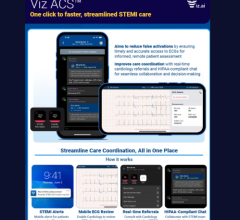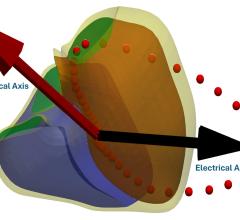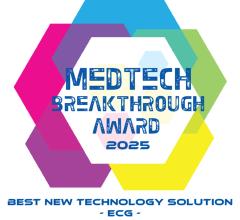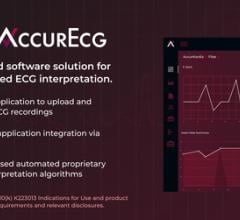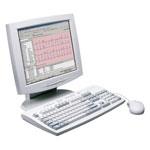
The electrocardiogram (ECG) stress test remains one of the most widely used diagnostic tools for detecting coronary heart disease. While the basics of stress test systems have changed little since their adoption, technologies continue to evolve to improve waveform analysis as well as connectivity to electronic medical records (EMRs) and wireless data acquisition capabilities.
Increased Flexibility
A significant emerging trend in ECG stress test systems is their increased flexibility of use. “It’s something that some of these new technologies allow, and [it’s] really [about] how the equipment is being used and deployed in the facility,” said Phil Salditt, senior manager of diagnostic cardiology products, Cardiac Science.
What used to be large pieces of equipment have been downsized to more portable systems. The Quinton 9500 series from Cardiac Science offer physicians the ability to optimize space in the exam room or lab. The 9500 stress test system is wall-mounted, while the 9550 system’s mobile cart configuration allows for easy portability. Other stress test system vendors, such as Schiller and Mortara, also feature compact and ergonomic designs.
Stress test systems are also becoming less purpose-built and more flexible in their application, allowing multiple points of care in a hospital, or even multiple facilities in a network, to share test analysis and patient information across common platforms.
PC-based ECG software that can be installed onto laptops or desktops already in use in a facility can significantly reduce capital costs for equipment and increase the ability to deploy ECG and stress testing anywhere in that facility, said Salditt. Systems that feature multiple cardiopulmonary modalities (such as resting ECG and Holter) in addition to exercise ECG are also useful for tracking data, as physicians no longer need to re-enter patient information each time another diagnostic test is performed.
The CardioPerfect Workstation suite from Welch Allyn is a comprehensive data management system that can be installed onto any PC and transform it for diagnostic use. Its exercise ECG modality features simultaneous 12-lead monitoring, customizable stress protocols and a scroll-back function to review any potential abnormalities.
Another example is the CareCenter MD wireless diagnostic workstation from Cardiac Science. Available modalities include treadmill, bicycle and pharmacological stress testing, as well as other ECG modalities.
Wireless Data Acquisition
Continued development of wireless data acquisition is also allowing for more flexible placement of patients and equipment within the exam room. Instead of tethering patients to the machine, physicians can place their workstations in a more convenient location while the patient is exercising. With pharmacological modalities, physicians can even perform stress testing on immobile patients at their bedside. Mortara’s WAM (wireless acquisition module) offers ECG acquisition and rhythm strip printing at the press of a button on the module. The CareCenter MD from Cardiac Science also features a handheld wireless acquisition device.
More lightweight cables and wireless technologies are also helping to reduce motion artifacts and background noise, resulting in a more accurate exercise ECG recording. Mortara offers LeadForm cables that are form-fitting and lightweight, reducing cable management and noise issues. In addition, the X-Scribe stress test system includes the wireless X12+ transmitter, removing the use of patient cables and allowing more freedom of movement and less interference from swinging wires. Included with X-Scribe is the company’s patented Source Consistency Filter (SCF), which removes noise that is not consistent in all leads while preserving the ECG signal and waveform. The filter aims to keep the QRS intact so diagnoses are more accurate, said Chuck Webster, senior vice president of global sales and marketing, Mortara.
Improved Quantification
Other stress testing innovations in recent years include the ability to detect certain cardiac risks in patients as they undergo the exam. Cardiac Science has combined its Q-Stress with Cambridge Heart’s microvolt T-wave alternans (MTWA) risk assessment software to help detect a patient’s risk for sudden cardiac arrest. The system also offers the Analytic Spectral Method (ASM) to detect every-other-beat patterns unique to patients at increased risk by analyzing the ECG in the frequency or spectral domain. This can also help improve noise and artifact filtering, according to Cardiac Science.
Both the CareCenter MD and the CardioPerfect ECG system offer detection for arrhythmias throughout the stress test. Schiller’s risk stratification tools include thrombolysis, heart rate variability and signal-averaged ECG.
Improved Connectivity Capability
As physician offices and cardiology departments continue to digitize their record systems, stress test vendors are working to improve the connectivity of data to a range of management solutions, from ECG management systems and cardiovascular information systems to picture archiving and communications systems (PACS) and electronic medical records (EMRs).
Most PC-based systems will easily integrate with EMRs in comparison to purpose-built devices, said Frits Kroon, global category director, cardiopulmonary, Welch Allyn. Systems such as Welch Allyn’s CardioPerfect and Cardiac Science’s Quinton Q-Stress contain bidirectional interface capabilities for easy data transfer to major EMRs. Similarly, the CareCenter MD connects to EMRs via Cardiac Science’s HeartCentrix device connectivity solution or can connect directly via an HL7 interface.
This year Mortara plans to roll out an improved interface with the next generation of its X-Scribe system, which is designed to integrate more easily with other Mortara products in addition to the company’s IT partners, such as Epiphany Cardiography and ScImage.
It is important for hospitals and cardiology departments to know which waveform formats are offered for each stress test system, as different vendors use a variety of standards. Not all of these data standards will be compatible with some third-party ECG management systems or EMRs. Most vendor-neutral ECG management systems typically will standardize text data on XML or HL7, while images commonly are saved as PDF. Reports can also be exported as PDF documents for easy e-mail sharing.
Mortara has standardized on the DICOM (digital imaging and communications in medicine) format, the universal format for medical images used in PACS. The company also offers XML, PDF and HL7 capabilities. The Quinton Q-Stress system from Cardiac Science offers compatibility with XML, PDF and HL7, while Welch Allyn’s CardioPerfect uses TIF, PDF and XML. The Pyramis ECG data management system from Cardiac Science also offers DICOM for all modalities.
As physicians move toward improving workflow efficiencies and adopting electronic storage and management systems, look for ECG stress test systems to become more flexible in their paperless delivery of reports as well as connectivity to a wide variety of third-party EMRs and other data management solutions.
Use of Automated BP Monitoring
A sidebar story that accompanied this story was "Seven Reasons Why to Use Automated Blood Pressure Measurementin Cardiac Stress-Testing." That story can be found at the following link: http://www.dicardiology.com/article/http://www.dicardiology.com/article/seven-reasons-why-use-automated-blood-pressure-measurement-cardiac-stress-testing

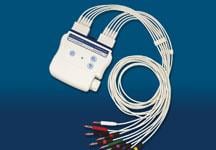
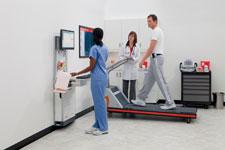
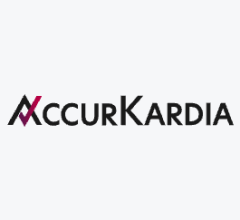
 January 15, 2026
January 15, 2026 


